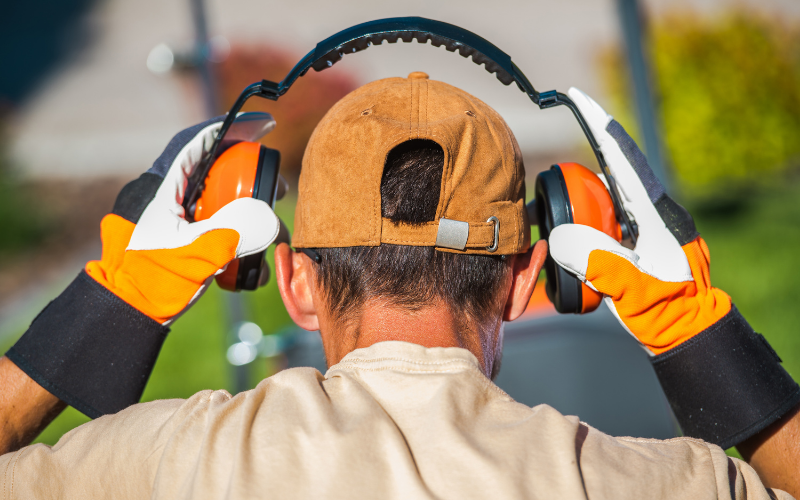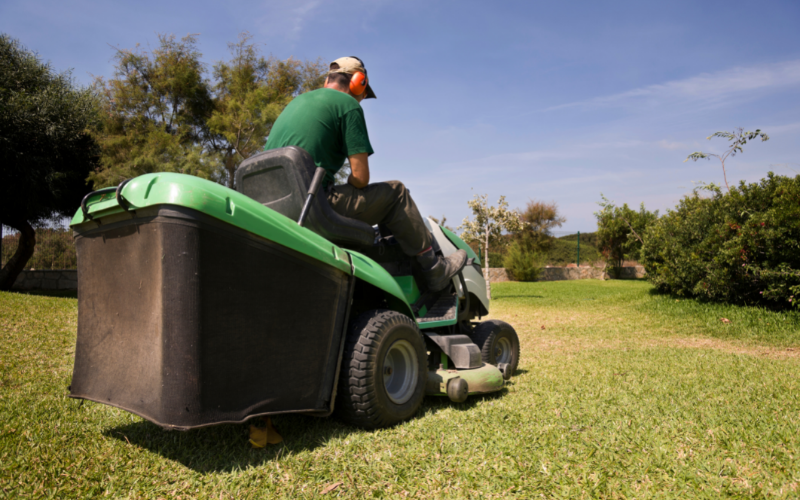Lawn mowers can be loud. And just as with any noise, a loud lawn mower can damage your hearing. However, push mowers and riding lawn mowers produce different decibels of sound. How loud is a lawn mower and will it damage your hearing? Read on for the answers.

How Is Sound Measured?
Sound is measured in decibels. One decibel is the just noticeable difference (JND) between sounds. Decibels are measured on a logarithmic scale. This means a sound that is 20db is ten times louder than a sound at 10db. The higher the number, the louder the sound.
How Loud Is Too Loud?
The decibel scale begins at 0, which is the softest sound humans can hear. According to the Center for Disease Control (CDC), normal conversation is at 60db. Sounds at 85db or louder will cause progressive hearing loss if you are exposed to them for more than two hours. This is cumulative. Loud noises of 100db or more cause sudden hearing loss when they occur.
What Happens If I Am Around Too Much Noise?
Sudden loud noises can damage cells and membranes in the cochlea. The cochlea is composed of an area lined by stereocilia, or tiny hairs, bathed in fluid. When noise hits the eardrum, it is transported into the cochlea. Different ranges of sound cause different stereocilia to react. Loud noises damage these hairs. If you hear a loud noise for a long time, the stereocilia are worked to death. Once the hearing is damaged, it is typically permanent. Loud noises can also damage the auditory nerve, the nerve transmitting the data from the stereocilia to the brain. Loud noises between 70-85 decibels can cause you to feel annoyed and be argumentative.

How Do I Tell If It Is Too Loud?
According to the CDC, if you have to yell to carry on a conversation, it is too loud where you are. You can also get apps that will measure the sound level for you. Sound meters work if you do not want to use an app. Loud noise does not always feel too loud right away. Damage is a function of decibels plus the length of exposure.
How Loud is a Lawn Mower: Different Types
There are many different types of lawn mowers, and to accurately answer the question of “how loud is a lawn mower” it’s necessary to look at each of these different types individually.
How Many Decibels Is A Gas Lawn Mower?
Gas lawn mowers are, on average, 85 decibels loud. Hearing damage starts to occur after two hours of mowing or being around a running lawn mower.
What About Electric Lawn Mower Decibels?
Electric mowers are much quieter than gas mowers. They only produce 75 decibels. However, that is enough to make someone feel annoyed and irritable. Seventy-five decibels is unlikely to damage your hearing.
How Many Decibels Is A Riding Mower?
A tractor without a cab pulling a shredder comes in at 102db. Hearing damage starts to occur after four minutes. A tractor with a cab is 92db. It is safe for ninety minutes. A riding mower is 102db. Hearing damage begins to occur after only nine minutes.
Protecting Your Hearing When Mowing
Making your lawn mower quieter will help protect your hearing. Make sure your mower is in good condition, well-lubricated, and that any available sound reduction strategies offered by the manufacture are used.
Wearing ear protection is a good strategy to protect your hearing. Hearing protection is labeled with its Noise Reduction Rate (NRR) in decibels. This number ranges from 0-35db. Different types of ear protection have different NRR levels. Look for one with an NRR of 25 or more. You can double up with more than one type of hearing protection if necessary. Here are some hearing protection types to explore. Remember, the best hearing protection is the one you will use.
Roll Down Foam Earplugs
These are rolled into a long cylinder and placed so that at least half of the length is in the ear canal. When placed in the ear canal, the plugs expand to seal the canal off. They are cheap and disposable. However, they must be inserted correctly. If they are not, they will not make a good seal and won’t work.
Reusable Ear Plugs
These often come with a string attached so you can keep them around your neck when not needed. These are washable, too. Because they are preformed, you may have to try several sizes to get one that will go in and seal. You also have to keep them clean; not always easy when working outside.
Custom Molded Ear Plugs
These are made by taking a mold of your ear and making an earplug from the mold. These earplugs are comfortable and fit correctly. However, they can only be made by a licensed hearing professional.
Canal Caps
Worn around the neck, these stick in and cap the ear canal. They are not as comfortable as other devices and do not protect the hearing as well.
Earmuffs
These are easy to fit and keep clean. They fit most people. However, they can be heavy and hot. It may be difficult to get a good seal if you are wearing glasses.
Final Thoughts
Lawn mowers of all types can be noisy. Wearing hearing protection can keep you from suffering from progressive hearing loss. This kind of loss is gradual, so by the time you notice it, the loss is permanent. You can have a great lawn and hear great too if you take some simple precautions.


Leave a Reply